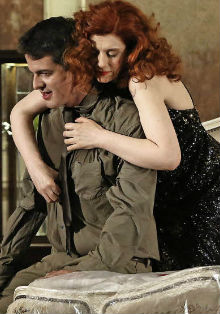The King with Pedro Sánchez at Zarzuela Palace./ Photo: Casa de S.M. el Rey
Cristina de la Hoz. 01/02/2016
For the first time during the democracy, His Majesty the King is facing the dilemma of offering the investiture to the candidate of the second most voted party, that is to Pedro Sánchez, who is already bracing himself for this eventuality. In fact, his intention is to begin this week, as soon as he receives the offer from the King, to negotiate “left and right” an agreement that will lead to his investiture.
If it were up to Sánchez, he would prefer support from Albert Rivera rather than Pablo Iglesias, but before that he would have to wrench a “yes” from the leader of Ciudadanos and the abstention, an impossibility, at this point in time, of Marian Rajoy. Only this way would he receive more votes in favour, 130, than against, 97, and 123 abstentions. And later he would have to undertake the task of governing alone with only 90 seats, given Rivera’s aversion to being involved in a coalition government.
But the second scenario is not much better for the Socialist leader as it implies accepting, among other things, Pablo Iglesias, as vice-president. Those surrounding Sánchez say that he would never go for a coalition whose composition was “based on mistrust”. In addition, it is unlikely such a pact would receive the seal of approval from the most influential members of the party. However, a yes from his political supporters would make their resistance impossible.
Consulting party members would be made with a document that would contain all the terms of a hypothetical agreement- which would also be very complicated to produce- and would require the abstention of the Independents in Congress.
[hr style=”single”]
A pact with Ciudadanos, requires the abstention of the PP, one with Podemos, that of the Independents
[hr style=”single”]
The only thing that does not fit in the Socialist agenda is the order of the interviews that the King has to conclude this week. As in the first round, Mariano Rajoy will be the last to see the monarch, so that in PP headquarters it is considered unlikely that the King will offer Sánchez anything prior to listening to the acting president. They believe it will be Wednesday when this offer materialises.
For its part the Socialist headquarters yesterday called an unusual Sunday press conference at which the Sectorial Under-secretary, Javier Maroto, put forward the opinion that Rajoy would decline once again to go to an investiture session. The idea behind such a peremptory announcement is that all the pressure would be back on Sánchez once more.
The Socialist leader has spent days nurturing the bombshell of proposing to the Federal Committee that he would seek the opinion of the party members, knowing that “it is very difficult to oppose what the rank and file are saying”, much more inclined to an agreement with the brown party according to PSOE sources. Few were entrusted with the secret. At most it was let fall that there would be a “surprise” at the meeting, without further specification. To the more critical influential members, he did not even mention that. By way of exchange, they forced the holding of a federal convention for the beginning of May, convinced that the interests of Sánchez would be unsuccessful and there would have to be new general elections with a new leader and candidate. However, it is not so clear. The PP believes that if there are new elections, the conclave would be delayed however much certain people applied pressure to the contrary.
[hr style=”single”]
Genova is keeping its campaign teams in case there is a repetition of the elections
[hr style=”single”]
Moncloa and Génova are also working on a repeated elections scenario. The expectations that the PSOE Federal Committee would strike down the endeavours of Sánchez to form a government and open up the possibility of the abstention that would permit Rajoy’s investiture have been shot to pieces.
The man responsible for the PP campaign and the acting president’s Chief of Staff Jorge Moragas, is keeping operative the structures that he created for the elections of 20 December, and in the corridors of the national headquarters, they are joking that “at least there will not have to be a new manifesto”.






